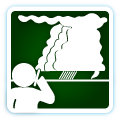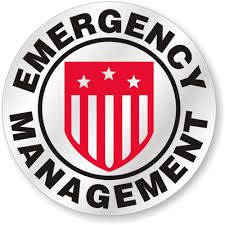Philadelphia/Mt Holly
Weather Forecast Office
Tornado - A violently rotating column of air touching the ground, usually attached to the base of a thunderstorm.
Tornadoes are nature"s most violent storms. Spawned from powerful thunderstorms, tornadoes can cause fatalities and devastate a neighborhood in seconds. Winds of a tornado may reach 300 miles per hour. Damage paths can be in excess of one mile wide and 50 miles long. Strong downburst (straight-line) winds may also occur due to the same thunderstom. Hail is very commonly found very close to the tornadoes, as the strongest thunderstorms that spawn tornadoes are formed under the atmospheric conditions that are also highly likely to make hail. Every state is at some risk from this hazard.
Some tornadoes are clearly visible, while rain or nearby low-hanging clouds obscure others. Tornadoes develop extremely rapidly, and may dissipate just a quickly. Most tornadoes are on the ground for less than 15 minutes.
Before a tornado hits, the wind may die down and the air may become very still. A cloud of debris can mark the location of a tornado even if a funnel is not visible. Tornadoes generally occur near the trailing edge of a thunderstorm. It is not uncommon to see clear, sunlit skies behind a tornado.
The EF-Scale is a rating of how strong a tornado was. It is calculated by surveying the damage and comparing it with damage to similar objects at certain wind speeds. The EF-Scale is not meant to be used as a measure of how strong a tornado currently on the ground is. Link to the SPC Page on the EF-Scale
The EF Scale was implemented across the country in February of 2007. The EF-Scale is meant to further refine the tornado wind-force classifications begun using the F-Scale. The use of the EF-Scale should lead to more accurate and uniform tornado strength estimates by investigators.
See this excellent reference on Tornadoes
Nature's Most Violent Storms
More information on Tornadoes
US Dept of Commerce
National Oceanic and Atmospheric Administration
National Weather Service
Philadelphia/Mt Holly
732 Woodlane Rd.
Mount Holly, NJ 08060
609-261-6600
Comments? Questions? Please Contact Us.


 Coastal Flood
Coastal Flood Marine Forecasts
Marine Forecasts Text Products
Text Products Climate Information
Climate Information Skywarn
Skywarn Submit Storm Report
Submit Storm Report Weather Event Archives
Weather Event Archives Forecast Discussion
Forecast Discussion Emergency Managers
Emergency Managers Briefing Page
Briefing Page